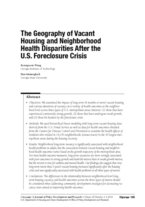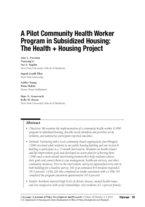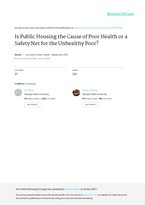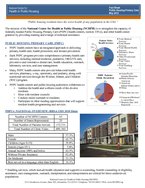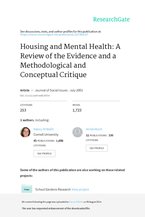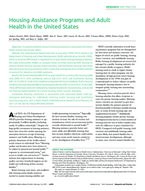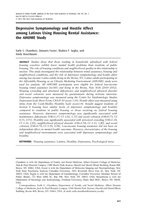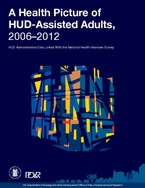0
Research
Community:
Nov 22, 2018
Improved access to health insurance contributed to reducing worry and stress associated with paying rent/mortgage or purchasing meals among low-income people. Expanding health insurance access may have contributed to increasing the disposable income of low income groups.
Authored by: Shiho Kino, Koryu Sato, and Iciro Kawachi for International Journal for Equity in Health
Topics: Affordable Care Act, Health, Housing, Low-income, Medicaid / Medicare, Mental health, Research, Stability
 Shared by Mica O'Brien
Shared by Mica O'Brien
Mica O'Brien posted a
on Mar 7, 2019
Shiho Kino, Koryu Sato, and Iciro Kawachi for International Journal for Equity in Health
Improved access to health insurance contributed to reducing worry and stress associated with paying rent/mortgage or purchasing meals among low-income people. Expanding health insurance access may have contributed to increasing the disposable income of low income groups.
0
Research
Community:
Nov 1, 2018
In this study, researchers conduct a literature review across public health, environmental health, medical, sociology, and urban planning journals to synthesize the research on the mental health effects of rat infestations on residents living in urban neighborhoods.
Authored by: Kaylee Byers, Chelsea G. Himsworth, and Raymond Lam for The Journal of Environmental Health
Topics: Health, Housing, Low-income, Mental health, Research, Safety
 Shared by Housing Is
Shared by Housing Is
Housing Is posted a
on Feb 28, 2019
Kaylee Byers, Chelsea G. Himsworth, and Raymond Lam for The Journal of Environmental Health
In this study, researchers conduct a literature review across public health, environmental health, medical, sociology, and urban planning journals to synthesize the research on the mental health effects of rat infestations on residents living in urban neighborhoods.
0
Policy Brief
Community:
Aug 9, 2018
Everyone needs safe, decent, stable housing. For some of the most vulnerable people in America — people with mental illness, chronic health conditions, histories of trauma, and other struggles — a home helps them to get adequate treatment and start on the path toward recovery. But some conditions make it difficult for people to maintain a stable home without additional help. Supportive housing, a highly effective strategy that combines affordable housing with intensive coordinated services, can provide that needed assistance.
Authored by:
Topics: Cost effectiveness, Disabilities, Health, Homelessness, Housing, Low-income, Medicaid / Medicare, Mental health, Place-based, Seniors, Supportive housing
 Shared by Housing Is
Shared by Housing Is
Housing Is posted a
on Aug 9, 2018
Everyone needs safe, decent, stable housing. For some of the most vulnerable people in America — people with mental illness, chronic health conditions, histories of trauma, and other struggles — a home helps them to get adequate treatment and start on the path toward recovery.
0
Policy Brief
Community:
Aug 9, 2018
Social determinants of health are the economic and social conditions that affect health outcomes and are the underlying, contributing factors of health inequities. Examples include housing, educational attainment, employment and the environment.
Authored by:
Topics: Affordable Care Act, Disabilities, Health, Homelessness, Housing, Low-income, Medicaid / Medicare, Mental health, Partnerships, Place-based, Substance abuse, Supportive housing
 Shared by Housing Is
Shared by Housing Is
Housing Is posted a
on Aug 9, 2018
Social determinants of health are the economic and social conditions that affect health outcomes and are the underlying, contributing factors of health inequities. Examples include housing, educational attainment, employment and the environment.
1
Research
Community:
Aug 1, 2018
We examined the impact of long-term (6 months or more) vacant housing and various durations of vacancy on a variety of health outcomes at the neighborhood level across three types of U.S. metropolitan areas (metros): (1) those that have experienced consistently strong growth, (2) those that have undergone weak growth, and (3) those hit hardest by the foreclosure crisis
Authored by:
Topics: Asset building, Asthma, Community development, Health, Housing, Low-income, Mental health, Metrics, Research, Safety, Transportation
 Shared by Housing Is
Shared by Housing Is
Housing Is posted a
on Aug 1, 2018
We examined the impact of long-term (6 months or more) vacant housing and various durations of vacancy on a variety of health outcomes at the neighborhood level across three types of U.S.
0
Research
Community:
Aug 1, 2018
This study draws on qualitative interview data to examine transitions into rent-assisted housing as they relate to diabetes self-management behaviors.
Authored by:
Topics: East Coast, Health, Homelessness, Housing, Low-income, Mental health, Metrics, Nutrition, Research, Stability
 Shared by Housing Is
Shared by Housing Is
Housing Is posted a
on Aug 1, 2018
This study draws on qualitative interview data to examine transitions into rent-assisted housing as they relate to diabetes self-management behaviors.
0
Research
Community:
Aug 1, 2018
Work requirements in public housing are highly controversial, and
little is known about their impacts. We examined how implementation of a work requirement paired with supportive services by Charlotte Housing Authority has impacted residents’ overall well-being. Although the policy might improve well-being
by increasing household income, it might also engender stress through greater housing precarity.
Authored by:
Topics: Depression, Disabilities, Education, Food insecurity, Health, Housing, Low-income, Medicaid / Medicare, Mental health, Metrics, MTW, Partnerships, Racial inequalities, Research, South, Workforce development
 Shared by Housing Is
Shared by Housing Is
Housing Is posted a
on Aug 1, 2018
Work requirements in public housing are highly controversial, and
little is known about their impacts. We examined how implementation of a work requirement paired with supportive services by Charlotte Housing Authority has impacted residents’ overall well-being.
0
Research
Community:
Aug 1, 2018
We examine the implementation of a community health worker (CHW)
program in subsidized housing, describe needs identified and priorities set by residents, and summarize participant-reported outcomes.
Authored by:
Topics: East Coast, Health, Housing, Low-income, Mental health, Metrics, Partnerships, Place-based, Racial inequalities, Research
 Shared by Housing Is
Shared by Housing Is
Housing Is posted a
on Aug 1, 2018
We examine the implementation of a community health worker (CHW)
program in subsidized housing, describe needs identified and priorities set by residents, and summarize participant-reported outcomes.
0
Research
Community:
Jul 27, 2018
The purpose of this paper is to investigate the association between public housing and health conditions: specifically, we ask if residents entered public housing already ill or if public housing may cause the poor health of its residents.
Authored by:
Topics: Health, Housing, Low-income, Mental health, Metrics, Mobility, Nutrition, Racial inequalities, Research, South
 Shared by Housing Is
Shared by Housing Is
Housing Is posted a
on Jul 27, 2018
The purpose of this paper is to investigate the association between public housing and health conditions: specifically, we ask if residents entered public housing already ill or if public housing may cause the poor health of its residents.
0
Policy Brief
Community:
Jul 23, 2018
Public Housing Primary Care (PHPC) health centers have an integrated approach to delivering primary health care, health promotion, and disease prevention. PHPC health centers work closely with public housing authorities to address the health and wellness needs of the diverse residents.
Authored by:
Topics: Funding, Health, Housing, Low-income, Mental health, Partnerships, Place-based
 Shared by Housing Is
Shared by Housing Is
Housing Is posted a
on Jul 23, 2018
Public Housing Primary Care (PHPC) health centers have an integrated approach to delivering primary health care, health promotion, and disease prevention. PHPC health centers work closely with public housing authorities to address the health and wellness needs of the diverse residents.
0
Research
Community:
Jul 20, 2018
Despite the fact that people invest more financial, temporal, and psychological resources in their homes than in any other material entity, research on housing and mental health is remarkably underdeveloped. We critically review existing research on housing and mental health, considering housing type (e.g., singlefamily detached versus multiple dwelling), floor level, and housing quality (e.g., structural damage). We then discuss methodological and conceptual shortcomings of this literature and provide a theoretical framework for future research on housing quality and mental health.
Authored by:
Topics: Depression, Health, Housing, Mental health, Research
 Shared by Housing Is
Shared by Housing Is
Housing Is posted a
on Jul 20, 2018
Despite the fact that people invest more financial, temporal, and psychological resources in their homes than in any other material entity, research on housing and mental health is remarkably underdeveloped.
0
Research
Community:
Jul 18, 2018
We examined whether receiving housing assistance is associated with improved health and well-being using a nationally representative sample of the US population. Specifically, we examined whether entry into housing assistance was associated with better reported health or reduced psychological distress relative to awaiting admission and whether there were differential effects associated with the 3 primary program categories: public housing, housing choice vouchers, and multifamily housing. Furthermore, we explored whether the health effects of housing assistance are mediated by neighborhood characteristics.
Authored by:
Topics: Health, Housing, Low-income, Mental health, Research
 Shared by Housing Is
Shared by Housing Is
Housing Is posted a
on Jul 18, 2018
We examined whether receiving housing assistance is associated with improved health and well-being using a nationally representative sample of the US population.
0
Policy Brief
Community:
Jul 17, 2018
The Denver Social Impact Bond program is an initiative aimed at measurably improving the lives of people most in need by driving resources towards better, more effective programs. Social Impact Bonds are a unique type of performance-based contract where private and/or philanthropic lenders loan funds to accomplish a specific objective and are repaid based on whether the program achieves its goals. Denver’s Social Impact Bond program will use funds from lenders to provide housing and supportive case management services to at least 250 homeless individuals who frequently use the city’s emergency services, including police, jail, the courts and emergency rooms.
Authored by:
Topics: Community development, Cost effectiveness, Criminal justice, Health, Homelessness, Housing, Low-income, Mental health, Partnerships, Stability, Substance abuse, West Coast
 Shared by Housing Is
Shared by Housing Is
Housing Is posted a
on Jul 17, 2018
The Denver Social Impact Bond program is an initiative aimed at measurably improving the lives of people most in need by driving resources towards better, more effective programs.
0
Research
Community:
Jul 11, 2018
Studies show that those residing in households subsidized with federal housing vouchers exhibit fewer mental health problems than residents of public housing. The role of housing conditions and neighborhood quality in this relationship is unclear. This study investigated the relationship between rental assistance, housing and neighborhood conditions, and the risk of depressive symptomology and hostile affect among low-income Latino adults living in the Bronx, NY
Authored by:
Topics: Depression, East Coast, Health, Housing, Low-income, Mental health, Obesity, Racial inequalities, Research, Stability
 Shared by Housing Is
Shared by Housing Is
Housing Is posted a
on Jul 11, 2018
Studies show that those residing in households subsidized with federal housing vouchers exhibit fewer mental health problems than residents of public housing. The role of housing conditions and neighborhood quality in this relationship is unclear.
0
Research
Community:
Jul 11, 2018
A Research Review and Comment on Future Directions for Integrating Housing and Health Services
Authored by:
Topics: Affordable Care Act, Cost effectiveness, Data sharing, Exercise, Health, Homelessness, Housing, Low-income, Medicaid / Medicare, Mental health, Metrics, Nutrition, Obesity, Partnerships, Preventative care, Research, Supportive housing
 Shared by Housing Is
Shared by Housing Is
Housing Is posted a
on Jul 11, 2018
A Research Review and Comment on Future Directions for Integrating Housing and Health Services
0
Policy Brief
Community:
Jul 10, 2018
This brief explores how state Medicaid agencies have utilized a variety of federal authorities and delivery systems to increase access to supportive housing services and highlights important implementation considerations.
Authored by:
Topics: Cost effectiveness, Criminal justice, Data sharing, Funding, Health, Healthy homes, Homelessness, Housing, Legislation & Policy, Low-income, Medicaid / Medicare, Mental health, Partnerships, Substance abuse, Supportive housing
 Shared by Housing Is
Shared by Housing Is
Housing Is posted a
on Jul 10, 2018
This brief explores how state Medicaid agencies have utilized a variety of federal authorities and delivery systems to increase access to supportive housing services and highlights important implementation considerations.
0
Research
Community:
Jun 22, 2017
Unprecedented descriptive analysis linking HUD administrative data and results from the National Health Interview Survey (pre-Affordable Care Act)
Authored by:
Topics: Affordable Care Act, Cost effectiveness, Dental, Depression, Exercise, Health, Healthy homes, Housing, Medicaid / Medicare, Mental health, Nutrition, Obesity, Research, Seniors, Smoke-free, Substance abuse
 Shared by Steve Lucas
Shared by Steve Lucas
Steve Lucas posted a
on Jun 22, 2017
From the Office of Policy Development and Research (PD&R) at the U.S. Department of Housing and Urban Development:
Unprecedented descriptive analysis linking HUD administrative data and results from the National Health Interview Survey (pre-Affordable Care Act)
 Shared by Housing Is
on Feb 28, 2019
Shared by Housing Is
on Feb 28, 2019
 Shared by Housing Is
on Aug 9, 2018
Shared by Housing Is
on Aug 9, 2018
 Shared by Housing Is
on Aug 9, 2018
Shared by Housing Is
on Aug 9, 2018
 Shared by Housing Is
on Aug 1, 2018
Shared by Housing Is
on Aug 1, 2018
 Shared by Housing Is
on Aug 1, 2018
Shared by Housing Is
on Aug 1, 2018
 Shared by Housing Is
on Aug 1, 2018
Shared by Housing Is
on Aug 1, 2018
 Shared by Housing Is
on Aug 1, 2018
Shared by Housing Is
on Aug 1, 2018
 Shared by Housing Is
on Jul 27, 2018
Shared by Housing Is
on Jul 27, 2018
 Shared by Housing Is
on Jul 23, 2018
Shared by Housing Is
on Jul 23, 2018
 Shared by Housing Is
on Jul 20, 2018
Shared by Housing Is
on Jul 20, 2018
 Shared by Housing Is
on Jul 18, 2018
Shared by Housing Is
on Jul 18, 2018
 Shared by Housing Is
on Jul 17, 2018
Shared by Housing Is
on Jul 17, 2018
 Shared by Housing Is
on Jul 11, 2018
Shared by Housing Is
on Jul 11, 2018
 Shared by Housing Is
on Jul 11, 2018
Shared by Housing Is
on Jul 11, 2018
 Shared by Housing Is
on Jul 10, 2018
Shared by Housing Is
on Jul 10, 2018
 Shared by Steve Lucas
on Jun 22, 2017
Shared by Steve Lucas
on Jun 22, 2017






